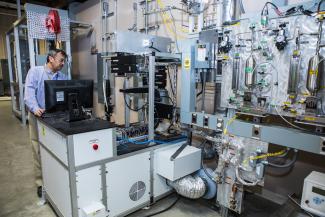Recognizing the potential of NETL’s microwave technology to decarbonize critical sectors of the economy, the U.S. Department of Energy’s Industrial Efficiency & Decarbonization Office has awarded federal funding for multiple new projects intending to drive transformational technology and innovation necessary to reduce industrial greenhouse gas (GHG) emissions.
NETL along with partners Covestro and RAPID are advancing the decarbonization of low temperature depolymerization processes by identifying lower energy routes to convert polymers into useful chemical building blocks that can be recovered and reused to re-manufacture new polymer products via the project “Decarbonizing Solvent Chemistry Through Microwave Processing.”
NETL is using microwaves to electrify the conversion process and tailor selectivity to reduce downstream processing. The project will also both experimentally test batch-to-continuous processing and model the next scale reactor for the depolymerization process. NETL will create a database of microwave-specific properties for common solvent systems that will be housed on the Energy Data eXchange for public use of other common industrial practices that could potentially use microwaves.
Advanced microwave reactors provide a means for precise, site-selective heat delivery to heterogeneous catalysts for catalytic reactions and/or materials processing. Another project that was awarded funding, “Decarbonizing Light Olefin Production using Advanced Electromagnetic Reactors,” focuses on microwave heating as a sustainable system leveraging recently demonstrated microwave and radio-frequency induction reactor designs with broad applicability across sectors and industrial processes reducing their GHG emissions and energy intensity.
NETL will lead another funded effort for microwave reactor design, which will use simulation modeling and experimental testing. In addition, NETL will work with other partners RAPID Manufacturing Institute, West Virginia University, the University of Delaware, the University of South Carolina, Mainland Solutions LLC, Autumn Energy Corporation, Dow Chemical, Shell International Exploration and Production, Siemens Corporation and the Electronic Power Research Institute to develop a commercial form of the catalyst for improved single-pass conversion and microwave absorption.
Kraft pulping has been a predominant chemical pulping process for several decades. Although substantial research efforts have been made, the basic chemistry and process remains the same.
The project “Enzyme/ Deep Eutectic Solvent Enhanced Kraft Pulping to Reduce its Carbon Intensity,” is developing technologies that can utilize enzymes and deep eutectic solvents (DES) to enhance Kraft pulping process to reduce chemical consumption and thermal energy while increasing the yield of the pulp, leading to improved overall process efficiency and reduced overall carbon intensity of the wood pulping process. A team lead by Western Michigan University with support from NETL, Auburn University, North Carolina State University, University of Wisconsin-Madison, Howard University, the National Renewable Energy Laboratory and Dow Chemical will develop and integrate microwave assisted kraft pulping technology to lower cooking temperature and duration time to achieve decarbonization goals on reductions of carbon intensity and energy consumption.
West Virginia University, NETL, West Virginia State University, University of South Carolina, Clemson University and Dow Inc. are working together on “Intensified Dynamic Non-Equilibrium Reactions by Pulsed Microwave Heating for Efficient Chemical Processing.”
The project is developing an energy efficient and low carbon intensity pulsed microwave reactor system that contributes to decarbonization of thermal processes across multiple industries. Using microwaves offers a transformational approach to heat delivery for chemical reaction that offers the benefits of decarbonizing chemical production through the electrification of process heating and dynamic heating scenarios not obtainable through conventional processes. The microwave approach enables the direct production of two energy-intensive commodity chemicals in the same reactor under milder process conditions. The project will lead to a robust supply of ethylene and ammonia, two of the most valuable chemicals to the U.S. manufacturing base, while also lower carbon intensity for their production.
NETL is a U.S. Department of Energy national laboratory that drives innovation and delivers solutions for an environmentally sustainable and prosperous energy future. By leveraging its world-class talent and research facilities, NETL is ensuring affordable, abundant and reliable energy that drives a robust economy and national security, while developing technologies to manage carbon across the full life cycle, enabling environmental sustainability for all Americans.




